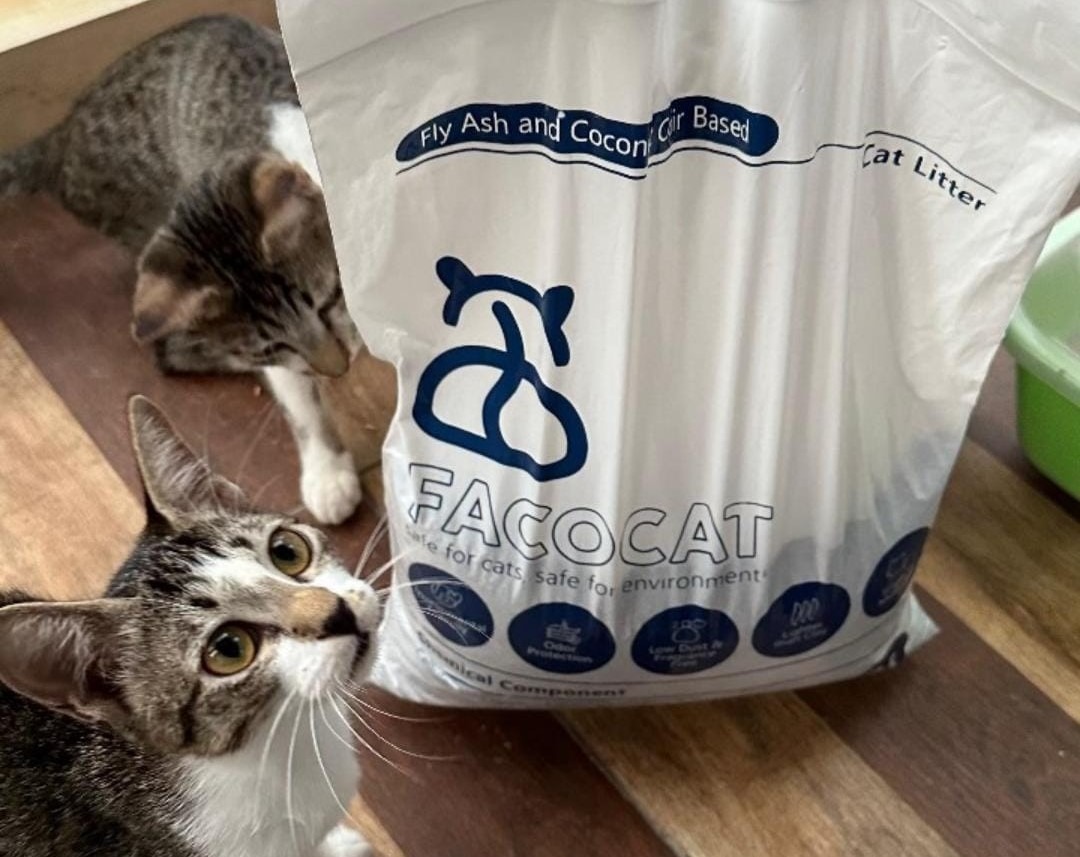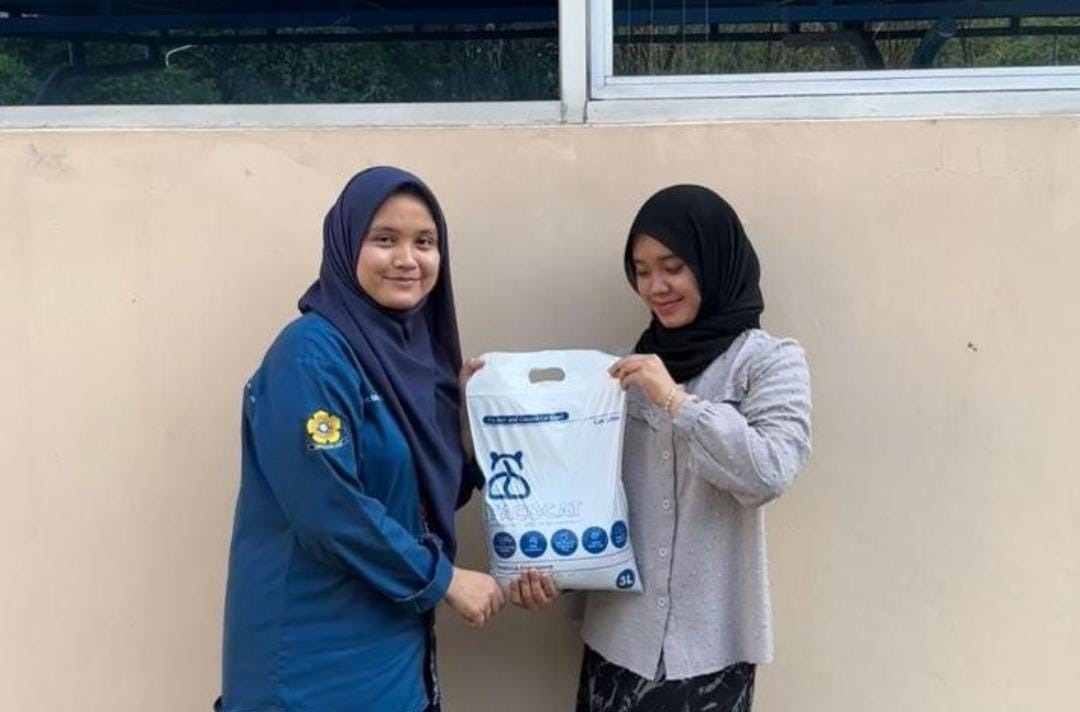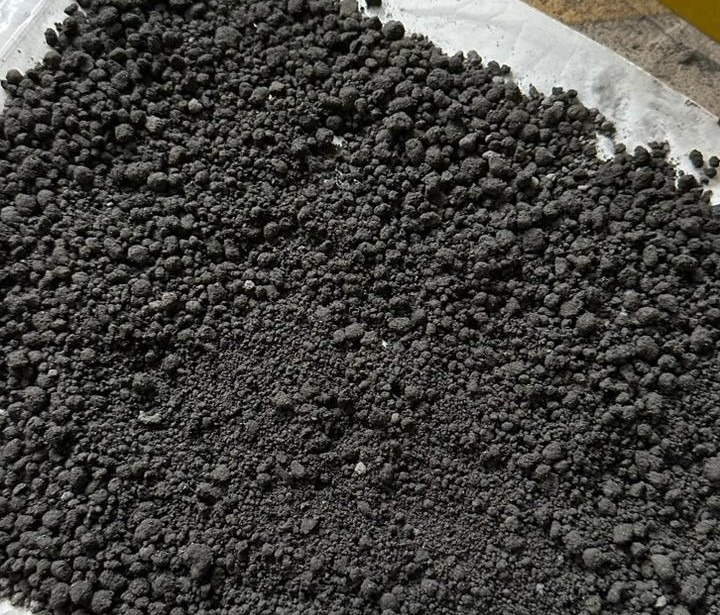ITS Students Create Eco-Friendly Cat Litter

Facocat, an eco friendly cat litter innovation made from fly ash and activated charcoal made by a team of ITS students
ITS Campus, ITS News – The large number of people who own cats in Indonesia has sparked opportunities in specific markets, one of which is cat litter. Departing from this, a team of students from the Department of Chemistry at the Institut Teknologi Sepuluh Nopember (ITS) developed Facocat, an environmentally friendly cat litter made from fly ash and activated charcoal from coconut husks.
Team leader Kalinda Ayu Prasasti revealed that this innovation was born because the majority of cat litter materials are carcinogenic and, of course, harmful to cats. “Therefore, we tried to utilize coconut husks and fly ash, which are more environmentally friendly, in making this cat litter,” explained Kalinda.
Discussing their innovative product in more detail, Kalinda explained that coconut husks contain cellulose content that can be processed into activated charcoal. Based on analyses conducted, it was found that activated charcoal has open pores, resulting in high absorption capacity. “This makes activated charcoal commonly used in purification processes,” she explained.

Team leader Kalinda Ayu Prasasti (right) giving Facocat products to one of the buyers
Furthermore, Kalinda added that fly ash has proven to clump well when exposed to cat waste and the urea odor produced. This is based on fly ash’s ability to quickly absorb moisture due to its high level of porosity. “So, Facocat can be disposed of directly into the soil without polluting the environment,” added the alumna of SMA Negeri 1 Bekasi.
In its processing, Kalinda stated that the production of Facocat is relatively simple. She explained that Facocat is made by activating the two materials (fly ash and activated charcoal) with the help of a binding agent to bring out its absorbent properties. After activation, the two materials are mixed, water is added, and then they are formed into litter using a granulator machine until ready to use.
Despite its simple manufacturing process, according to Kalinda, Facocat is the first environmentally friendly cat litter pioneer in Indonesia. This product has various advantages, namely odorless, clumps easily, can be directly disposed of into the soil, dust-free, food grade, and fragrance-free. “These advantages have garnered positive responses from buyers,” said this 2020 batch student.

Facocat display, environmentally friendly cat litter made from fly ash and activated charcoal created by a team of ITS students
Thanks to an intensified marketing strategy, Kalinda and her team managed to garner positive responses. Kalinda explained that their team sought to expand their marketing efforts by utilizing Instagram social media. “We not only sell Facocat but also educate our followers about the benefits and importance of good cat litter,” she said.
Through this innovation, the team, guided by ITS Chemistry Professor Prof. Hamzah Fanshuri SSi MSi PhD, also became one of the winners of the 36th National Student Scientific Week (Pimnas) in 2023 in the Poster category for Student Creativity-Entrepreneurship Program (PKM-K). “The hope is that Facocat can soon be mass-marketed and bring benefits to both pets and the environment,” she concluded hopefully. (ITS Public Relations)
Reporter: Hibar Buana Puspa
Related News
-
ITS Wins 2024 Project Implementation Award for Commitment to Gender Implementation
ITS Campus, ITS News —Not only technology-oriented, Institut Teknologi Sepuluh Nopember (ITS) also show its commitment to support gender
February 29, 2024 11:02 -
ITS Professor Researched the Role of Human Integration in Sustainable Architecture
ITS Campus, ITS News –The developing era has an impact on many aspects of life, including in the field
February 29, 2024 11:02 -
ITS Sends Off Group for Joint Homecoming to 64 Destination Areas
ITS Campus, ITS News — Approaching Eid al-Fitr, the Sepuluh Nopember Institute of Technology (ITS) is once again facilitating academics who want
February 29, 2024 11:02 -
ITS Expert: IHSG Decline Has Significant Impact on Indonesian Economy
ITS Campus, ITS News — The decline in the Composite Stock Price Index (IHSG) by five percent on March 18,
February 29, 2024 11:02
